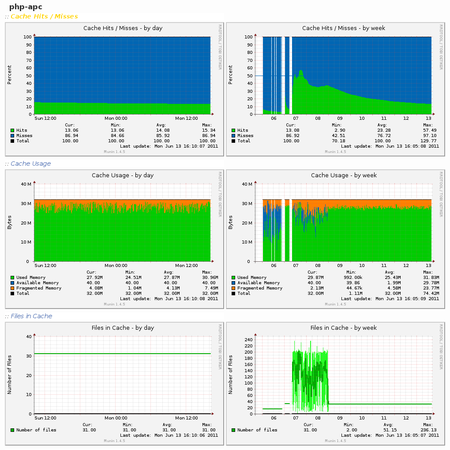Installing APC on Debian Squeeze is as simple as installing the package:
$ aptitude install php5-apc
In my case this package come from the PHP bundle distributed by the Dotdeb repository .
If installing APC is easy, monitoring it with Munin requires some extra manipulations. There is currently no good APC plugin available on Munin Exchange . So we’ll use the external munin-php-apc project instead.
The latter can’t get APC statistics by itself: it need an extra PHP file to be served locally. As you can read in my previous article, my Munin is powered by Nginx . So now we’ll setup Nginx to serve this extra PHP file:
$ mkdir -p /var/www/apc
$ cd /var/www/apc
$ wget https://munin-php-apc.googlecode.com/svn/trunk/php_apc/apc_info.php
$ chown -R www-data:www-data /var/www/apc
Then I need to update my
/etc/nginx/sites-available/munin
file (see
details
about this file on my previous
article
)
to have the second
server
section look like this:
server {
server_name localhost;
include /etc/nginx/php.conf;
root /var/www/apc;
allow 127.0.0.1;
deny all;
location / {
access_log off;
}
location /nginx_status {
stub_status on;
access_log off;
}
}
Here the included
/etc/nginx/php.conf
file is the one in which I’ve
concentrate all the Nginx directives required to activate PHP file parsing. The
content and the mechanism behind this file is describe in my
article on
setting up Nginx with
PHP-FPM
.
Let’s get back to our Munin monitoring setup. I can restart now Nginx and check that I can access locally to my raw statistics:
$ /etc/init.d/nginx reload
$ wget http://localhost/apc_info.php
$ wget http://localhost/nginx_status
The last step is to install and configure the Munin plugin:
$ aptitude install libwww-perl
$ wget https://munin-php-apc.googlecode.com/svn/trunk/php_apc/php_apc_ --output-document=/usr/share/munin/plugins/php_apc_
$ chmod -R 755 /usr/share/munin/plugins/
$ ln -s /usr/share/munin/plugins/php_apc_ /etc/munin/plugins/php_apc_usage
$ ln -s /usr/share/munin/plugins/php_apc_ /etc/munin/plugins/php_apc_hit_miss
$ ln -s /usr/share/munin/plugins/php_apc_ /etc/munin/plugins/php_apc_purge
$ ln -s /usr/share/munin/plugins/php_apc_ /etc/munin/plugins/php_apc_fragmentation
$ ln -s /usr/share/munin/plugins/php_apc_ /etc/munin/plugins/php_apc_files
$ ln -s /usr/share/munin/plugins/php_apc_ /etc/munin/plugins/php_apc_rates
$ echo "[php_apc_*]
user root
env.url http://localhost/apc_info.php?auto
" > /etc/munin/plugin-conf.d/php_apc
$ /etc/init.d/munin-node restart
And finally, after a while, you’ll get those beautiful graphs:

